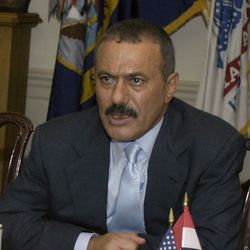President Ali Abdallah Salih of Yemen

This picture has been released into the public domain
Since that time, and despite the trappings of electoral democracy, Salih has strengthened his grip on political power to the point that the main opposition party, Islah, nominated him as its own candidate in 1999 elections.
A corrected version of report follows) President Ali Abdallah Salih has received on Tuesday Mr John Bolton, the US assistant secretary of state for armament and international security [as heard; his official title is.
by Parliament on October 1, 1994 to a five-year term.
Syria's Hafez Assad and Yemen's Ali Abdallah Salih discussed the development of conditions in the region and the stalemate in the peace process as a result of the Israeli government's attitudes.
the assassination of two predecessors in 1977 and 1978.
Mar 22: President `Ali `Abdallah Salih met with `Abdallah Mahmud Jabir, the envoy of Eritrean president Isaias Afwerki, to discuss bilateral relations.
See also, Regional Affairs, Qatar 1997 Oct 24: President `Ali `Abdallah Salih met with representatives of TOTAL, a French oil company, to discuss investment opportunities.
Yemeni President Ali Abdallah Salih said in an interview that his visit here and discussions with US.
When President Ali Abdallah Salih came clean about his drug habit during an election campaign, nobody here really cared what he did, how much or how frequently.
Considered (NPR) 06-29-2004 Interview: Barham Salih discusses planned changes in Iraq by the.
Considered (NPR) 05-04-2004 Interview: Barham Salih discusses issues of political importance.
00-9:00 PM ROBERT SIEGEL, host: Barham Salih is prime minister of the Kurdish Regional.
Salih is a leading spokesman for the most pro-Americ.
Transcript from: NPR Morning Edition; 3/25/2005; document.
Edition (NPR) 03-25-2005 Interview: Barham Salih discusses the new Iraqi government Host.
00-00-0000 Interview: Prime Minister Barham Salih discusses the repatriation of Kurds to.
Salih says the challenge now is creating a climate.
Things Considered (NPR) 05-23-2005 Interview: Barham Salih discusses current developments in Iraq Host: ROBERT SIEGEL.
Salih is currently minister of Planning in the transitional.
Considered (NPR) 01-31-2005 Interview: Barham Salih discusses Iraq's election and its future.
00-10:00 PM ROBERT SIEGEL, host: Barham Salih is deputy prime minister in the interim.
00-00-0000 Interview: Prime Minister Barham Salih discusses the state of his region, Kurdistan.
time the US and Iraq came to blows, and Salih says he hopes the international community.
Transcript from: NPR All Things Considered; 1/28/2004; document.
Considered (NPR) 01-28-2004 Interview: Barham Salih discusses why the Kurds of northern Iraq.
Barham Salih is prime minister of the Kurdistan Regional.
a id="ctl00_ContentPlaceHolder1_Malt3_RepeaterResults_ctl02_HyperLinkOmnitureTopicImage" href="/doc/fullarticle/1G1-80830921.
Al-Quds al-Arabi has learned from an informed source that two days prior to the convocation of this conference, Yemeni President Ali Abdallah Salih met prominent leaders that called for the formation of this commission headed by Shaykh Abd-al-Majid al- Zandani and Shaykh Humud Hashim al-Dharihi as well as tribal leader Shaykh Sadiq Abdallah al-Ahmar.
month with little sign of fully abating.
tribe -- after today) and that Salih was the enemy of God.
does not understand the dynamics of Yemeni politics.
following the assassination of two predecessors in 1977 and 1978.
It united the former Marxist, Russian-aligned Peoples Democratic Republic of Yemen (SouthYemen) with the more moderate tribal-and military-oriented Yemeni Arab Republic (North Yemen), over which Ali Abdallah Salih had presided since July 1978.
As his career progressed, Salih was increasingly drawn into Yemens political affairs, especially after the 1974 coup when Ibrahim al-Hamdi took over as president.
Thus, on July 17, 1978, after aggressive political maneuvering, Ali Abdallah Salih was elected North Yemens president and army commander-in-chief.
Like many in the military, Salih was an authoritarian nationalist and statist by nature.
Initially, President Salih was unsure of himself when dealing with foreign leaders, but this changed as he gained experience.
Unionist Party ; National Arab Socialist Baath Party [Dr.
President Ali Abdallah Salih was elected by Parliament on October 1, 1994 to a five-year term.
Salih said he would remain in office until the September 2006 elections.
We want to establish a model for peaceful handover of power," Salih said during a meeting with political parties and diplomats.
Having led the northern Yemen Arab Republic from 1978, and then assumed the presidency of the whole of Yemen following the countrys unification in 1990, Salih has enjoyed the second-longest rule in the Arab world, behind only Libyan strongman Muammar Qaddafi.
After the 1994 civil war, Salih supported the establishment of a Zaydi militia under the command of al-Huthi, who also revived the Zaydi parochial school system in the northwest of the country.
